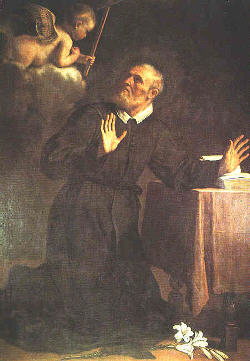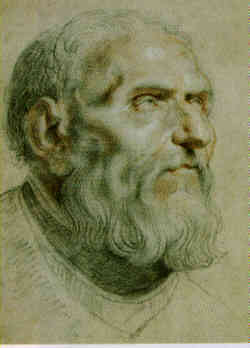 St. Philip Neri, the Apostle of Roma, is best known for his
contributions to the Church and the world during the period of profound
renewal known as the Catholic Reformation.
St. Philip Neri, the Apostle of Roma, is best known for his
contributions to the Church and the world during the period of profound
renewal known as the Catholic Reformation.Born in Florence in 1515, Philip came to the Eternal City at the age of 19 having renounced the prospect of riches. He remained in Rome until his death.
A layman until the age of 36, Philip's apostolate as a simple priest grew in the heart of Rome. His work focused on those abandoned and marginalized by society. For the sick whom he visited frequently, he established a home for convalescence. For pilgrims, he formed a special confraternity devoted to their care and built a hostel for them dedicated to the Holy Trinity. For the mentally ill, normally abandoned for life, he founded the Institute of S.Maria della Pietą, the first organization of its kind dedicated to their care.
As his work grew, so did its influence on the life of the city and of the Church. For popes and saints, the powerful and the humble, the priests and the laity for everyone St.Philip was a guiding light. He understood clearly, the needs of the all people, in the stratified class-structured society of his time. The sense of abandonment and despair, among the weakest classes and the sense of emptiness that dominated many parts of the merchant and noble classes led many to St. Philip as they searched for a more profound and meaningful way of life. He directed their consciences as a confessor, helping them to resolve their daily problems, giving them a more mature awareness of their faith and with his charismatic personality, he succeeded in engaging them in a life of charity.
 Gathering to himself people from every social class and background, St.Philip
succeeded in uniting all through the lessons, prayers, and music of the
Secular Oratory. He,also had a special ability for encouraging artists
to place their talents at the service of God. Thus, there arose from the
Oratory a cultural renewal which flowered in works of sacred music, volumes
of Church history, and an increasing interest in Christian archeology.
Gathering to himself people from every social class and background, St.Philip
succeeded in uniting all through the lessons, prayers, and music of the
Secular Oratory. He,also had a special ability for encouraging artists
to place their talents at the service of God. Thus, there arose from the
Oratory a cultural renewal which flowered in works of sacred music, volumes
of Church history, and an increasing interest in Christian archeology.Always happy, he communicated joy to whoever was near him, for this the people of Rome and of the Church remember him as the 'Saint of Joy. He especially loved children, cheerfully educating them to live the Christian life and sympathetically understanding their needs. "Be good, if you can!" he loved to say to the children that lived in the streets of Rome. For these poor children, Philip organized a school and later a college. Another of his creations, was the Visit to the Seven Churches. This pilgrimage, took St. Philip and his followers, people from all walks of life, on long treks to visit the ancient basilicas which dotted the countryside around Rome. The presence of St. Philip, guaranteed that these pilgrimages were not only times of reflection and prayer, but times of great fun as well, with plenty of music, games, and picnicing. Behind his untiring missionary zeal and pastoral work there was a intense life of prayer, rich in mystical experiences. He strove to live his life according to the motions and indications of the Spirit. Fundamental to his spirituality was his "personal pentecost." in 1544. When still a young man, he had the habit of venturing outside the city walls in the evenings and remaining in the catacombs of St.Sebastian, spending the night in prayer. On one of these occasions, there appeared to him a globe of fire, which descended and entered his heart. Today, one of the symbols of the Congregation of the Oratory, is the flaming heart (Cor Flammigerum).